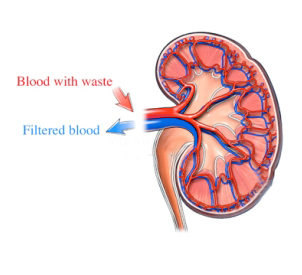
What Is Nephrotic Syndrome?
Nephrotic Syndrome is a disease of the kidney. It is derived from the two words ‘Nephros’ meaning kidney and ‘Syndrome’ denoting a group of symptom.
It is characterized by loss of proteins in the urine. It can affect children and adults of any age, male and female. It is more common in males.
Nephrotic Syndrome shows symptoms like swelling of face, abdomen, eyes, feet or hands. Alternately, one may notice an unusual gain in weight. There may be reduction in the quantity of urine. Lack of appetite, fever, diarrhea and raised blood pressure may be other symptoms.
Modern Medicine Treatment For Nephrotic Syndrome:
- Diuretics: Diuretics are certain medications that are given to reduce your swelling. Diuretics work by removing the additional fluid collected in the body by means of urine.
- Anti Hypertensives: Blood pressure lowering medications or Anti-Hypertensives may be prescribed if you have high blood pressure.
- Steroids: The most common nephrotic syndrome treatment is steroid medications which aim to stop the loss of proteins. Unfortunately, these steroids can have a number of side effects like increase in weight, rise in blood pressure, reduced bone density, increase in blood sugar levels, etc.
- Other Immuno-suppressants: Certain medications which suppress the immunity may be prescribed if steroids do not help enough or cause side effects which are too uncomfortable. Cortisone resistance and dependent Nephrotic Syndrome requires Cyclophosphamide as a medicine as a next line of treatment. Cyclophosphamide is powerful medicine having several side effects.
Homoeopathic Nephrotic Syndrome Treatment
In his experience, Dr Rajesh Shah has seen that homoeopathic medicines are very effective for Nephrotic syndrome treatment at Lifeforce. Homoeopathy aims to bring down the severity, frequency and duration of the recurrent episodes and to decrease the dependency on steroid medicines.
General Advice for Nephrotic Syndrome
Foods to be avoided:
- High protein content
- Excess Salt, fat intake
- Foods like: Salted wafers and biscuits, papads, popcorns, pickles, snacks, canned meat.etc
- Excess of oily food like butter, ghee, vegetable oil, processed cheese
Foods that can be taken:
Cow’s milk, skimmed milk





lipitor cost lipitor 40mg brand lipitor 40mg usa
order generic baycip – cheap sulfamethoxazole order generic augmentin 1000mg
buy baycip tablets – where to buy myambutol without a prescription augmentin 375mg oral
ciplox 500 mg for sale – cheap generic doxycycline buy erythromycin 250mg sale
flagyl 400mg without prescription – azithromycin 250mg brand order zithromax pill
ivermectin 3mg without prescription – buy generic tetracycline buy tetracycline cheap
buy metronidazole sale – zithromax sale azithromycin for sale online
order furosemide online cheap – candesartan 16mg for sale buy captopril 25mg without prescription
buy glycomet tablets – lincomycin pill lincocin over the counter
order generic retrovir 300 mg – buy allopurinol 300mg online zyloprim where to buy
clozaril 50mg ca – generic glimepiride 1mg pepcid where to buy
cost anafranil 25mg – amoxapine 50mg cost sinequan 25mg pills
atarax price – pamelor tablet order amitriptyline pill
buy augmentin pill – linezolid 600mg oral cipro brand
buy generic amoxil online – buy cephalexin 125mg for sale cipro pill
purchase zithromax – order tinidazole 500mg online brand ciprofloxacin
buy clindamycin without prescription – brand cefixime chloromycetin canada
ivermectin 6mg otc – aczone where to buy cefaclor 500mg pill
buy generic ventolin inhalator – order theo-24 Cr 400 mg generic theophylline 400 mg tablet
medrol over counter – brand montelukast brand azelastine 10ml
clarinex 5mg price – how to buy beclomethasone purchase ventolin inhaler
buy micronase 5mg online cheap – pioglitazone generic order forxiga without prescription
repaglinide online order – buy generic prandin over the counter empagliflozin 25mg uk
purchase semaglutide generic – DDAVP order desmopressin cheap
lamisil 250mg canada – terbinafine order purchase grifulvin v for sale